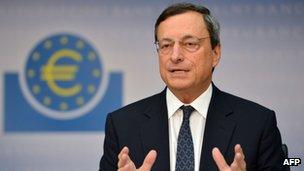Will Mario Draghi’s plan be enough?
- Published
- comments

Mario Draghi stressed that any bond purchases would come with strings attached
If Jean-Claude Trichet had ever declared that the European Central Bank (ECB) was willing to provide a "fully effective backstop" against the break-up of the euro, it's quite possible that the crisis in the eurozone would be over by now.
Of course countries like Spain would still be having a tough time, but we might well not be talking about them as much - and we might not be paying so much attention to ECB press conferences.
Needless to say, Mario Draghi's predecessor at the top of the ECB never said anything nearly as supportive. And the bond purchases he reluctantly sanctioned in 2010 and 2011 were a lot more half-hearted than the programme of "outright monetary transactions" described, at some length, by Mr Draghi, today.
Is talk of an ECB "backstop" enough to resolve the crisis in the autumn of 2012, under President Draghi? Initially, some in the financial markets seemed to have their doubts. The immediate reaction to Mr Draghi was that people sold euros, and the value of the currency fell. But stock markets have leaped since the end of the press conference, suggesting that - for once -the ECB has not disappointed.
The ECB president talked, again and again, about conditionality - about the strings that would be attached to the new bond purchases. And, for good measure, he revealed that the ECB would seek IMF involvement in crafting the terms of that conditionality.
That makes it sound like the Outright Monetary Transactions, or OMT - one twitter wag suggested it should stand for "On My Tab"- will be hard for countries to get, and easy to lose.
Perhaps. But we should remember that "IMF involvement" doesn't mean quite what it used to mean. In devising the European bailout programmes, it has been the European Commission and the governments that have been insisting on the toughest terms. By comparison, the IMF staff have usually been the doves, asking for slower timetables when it comes to cutting the budget deficits, and calling for a greater focus on growth. Prime Minister Rajoy will note that they have especially pushed for a slower path of deficit reduction in Spain.
We should also remember what Mario Draghi did not say. He did not say there would be any limits on the purchases. And he did not say the vote was unanimous. The ECB's governing council went ahead with this programme, despite German opposition. And it did so, despite the evident discomfort within the institution about being even "one leg" of a programme which to many of them feels like the central bank letting profligate governments and unwise private investors off the hook.
If you were Mario Draghi you would talk a lot about conditionality as well. You would also want to assert, again and again, that the central bank had not and would not compromise on its independence. Even to the point, some will say, of protesting too much.
Some in the financial markets will be disappointed by his performance. They - and many governments - will certainly be disappointed that it has taken so long for the ECB to step up to the plate. We should not forget that many hardliners - inside and outside the ECB - will be deeply disappointed too.